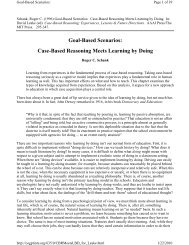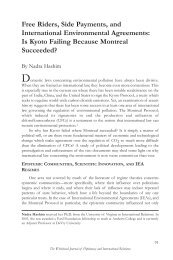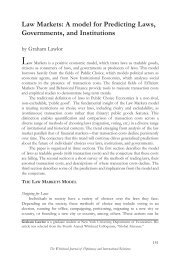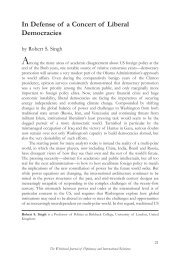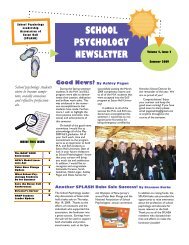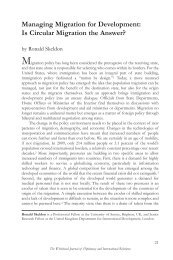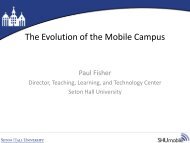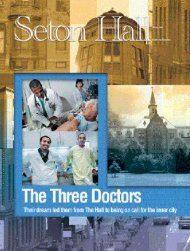Rethinking the Cuban Regime: Implications for Transition Paths and ...
Rethinking the Cuban Regime: Implications for Transition Paths and ...
Rethinking the Cuban Regime: Implications for Transition Paths and ...
You also want an ePaper? Increase the reach of your titles
YUMPU automatically turns print PDFs into web optimized ePapers that Google loves.
REThInkIng ThE CUbAn REgIME<br />
pluralism substantially exp<strong>and</strong>ed since <strong>the</strong> early 1990s in comparison to previous<br />
regime phases. between 1989 <strong>and</strong> 1999, <strong>the</strong> self-employment sector increased from<br />
5 to almost 25 percent of <strong>the</strong> work <strong>for</strong>ce. These measures opened space <strong>for</strong> new<br />
economic actors <strong>and</strong> correspond to <strong>the</strong> expected changes of a transition to posttotalitarianism<br />
in which economic pluralism precedes political pluralism. As Leon<br />
points out, “self employment in particular exemplified <strong>the</strong> influence of civil society<br />
over <strong>the</strong> state, in which <strong>the</strong> micro-systems of personal relations began to affect <strong>the</strong><br />
implementation of public policies <strong>and</strong>, given <strong>the</strong> context of <strong>the</strong> economic crisis, also<br />
<strong>for</strong>ced <strong>the</strong> state to modify its institutions. Indeed, <strong>the</strong> state allowed those who<br />
continue to benefit from its protection to obtain exceptionally high incomes-to be<br />
officially sanctioned profiteers.” 37<br />
The Special Period gave rise to what Fern<strong>and</strong>ez calls a proto-civil society, that is,<br />
“<strong>the</strong> increasing visibility <strong>and</strong> number of small <strong>and</strong> not-so small groups voicing<br />
different interests <strong>and</strong> expressing diverse identities within <strong>and</strong> without <strong>the</strong><br />
framework of <strong>the</strong> Party/State.” 38 The plethora of social, cultural, <strong>and</strong> even economic<br />
spaces <strong>and</strong> organizations that emerged <strong>and</strong> resisted or escaped state control indicate<br />
that in <strong>the</strong> charismatic post-totalitarian phase of <strong>the</strong> regime, detotalitarianization<br />
occurred by decay <strong>and</strong> societal conquest. The Catholic Church became <strong>the</strong> most<br />
important civil society organization in Cuba. The visit of Pope John Paul II in<br />
January 1998 revitalized <strong>the</strong> Church <strong>and</strong> allowed it to develop a stronger presence in<br />
<strong>Cuban</strong> society. 39<br />
Political pluralism remained nonexistent. The PCC continued to be <strong>the</strong> only<br />
legal party, <strong>and</strong> <strong>the</strong> regime alternated between outright repression <strong>and</strong> more subtle<br />
<strong>for</strong>ms of intimidation against dissidents. In spite of this, independent trade unions,<br />
peasant organizations, press associations, <strong>and</strong> even political parties made an<br />
appearance in <strong>the</strong> 1990s. Undoubtedly, contemporary <strong>Cuban</strong> society began to exhibit<br />
signs of pluralism by societal conquest unimaginable in earlier phases of <strong>the</strong><br />
Revolution.<br />
During <strong>the</strong> Special Period, <strong>the</strong> regime <strong>the</strong> regime sought to rely like never be<strong>for</strong>e<br />
on Fidel Castro’s charismatic leadership <strong>and</strong> power. As his health visibly deteriorated,<br />
a post-Fidel regime became increasingly imminent, raising <strong>the</strong> expectation in <strong>and</strong> out<br />
of <strong>the</strong> isl<strong>and</strong> as to what would happen once Fidel Castro would not be <strong>the</strong> leader.<br />
The Raulista Phase (2006-Present):<br />
On July 2006, <strong>the</strong> <strong>Cuban</strong> regime entered its latest phase after <strong>the</strong> peaceful <strong>and</strong><br />
well orchestrated transfer of powers from Fidel Castro to Raul Castro. Since <strong>the</strong>n,<br />
<strong>the</strong> regime has experienced fur<strong>the</strong>r detotalitarianization, which positions it to a more<br />
consolidated post-totalitarian model. More importantly, this is <strong>the</strong> first regime phase<br />
that does not exhibit a charismatic leadership in <strong>the</strong> daily management of state<br />
affairs. In turn, <strong>the</strong> current leadership seems more preoccupied in<br />
institutionalization, decentralization, <strong>and</strong> pragmatic decision-making ra<strong>the</strong>r than an<br />
ideology <strong>and</strong> mass mobilizations.<br />
The change to a more managerial style of leadership brings <strong>the</strong> regime closer to<br />
www.journalofdiplomacy.org<br />
139<br />
Summer/Fall 2010




